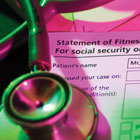GPs are coming under increasing pressure to provide reports to support welfare claims, with some practices becoming overwhelmed by the number of requests, warn LMCs.
In its October newsletter, Tayside LMC said GPs were being asked to provide evidence for patients who had become a carer for an ill relative and needed to move from job seekers allowance to employment support allowance.
And also that they had started to see patients coming in with a letter from the job centre asking the GP to confirm why their condition affects their ability to drive, walk or take public transport in order to be eligible for an access to work grant.
‘We support the view that the best approach is for these forms not to be sent out to GPs but unfortunately there is, as yet, no appetite from UK or Scottish Governments to address this unending flow of meaningless requests that fills up GP time and prevents them from seeing sick patients,’ the LMC said.
LMC chair Dr Andrew Cowie added that practices were in an incredibly difficult position when patients were understandably stressed and desperate to get as much information as possible to back up their application.
‘But there really is no potential end to this work. Some practices are getting three or four requests a day and it is overwhelming.
‘It is not just writing the reports, it is the regular appointments to talk about it and the anxiety that patients feel.’
He added that of course GPs wanted to support vulnerable patients but it was becoming a major issue.
Dr Uzma Ahmad, vice-chair of West Midlands LMC, said GPs were getting a lot of requests to provide reports to support personal independence payment because guidance gives the impression it will carry more weight.
‘We are seeing an increased number of requests from patients as they are kind of made to believe that having a report will make their case stronger for applications and most of them are just told verbally to get reports and more so for the appeal process.
‘This is another example where unresourced work has been dumped onto GPs in my opinion.’
GPC Scotland chair Dr Alan McDevitt said the issue was ongoing and every so often you would get a spate of requests for additional medical evidence as patients had been wrongly informed that it would bolster their case.
‘We have been very clear that this is a waste of GP time. Sometimes it is valid if there has been an unjust decision but this needs to be the exception rather than the rule.’
He added that any such requests should be dealt with as private work and charged for.
In 2016 the Scottish Parliament announced a range of new powers over benefits in particular providing top ups and discretionary payments.
Dr McDevitt said they had already started talking to the Government about what the GP role in that system should be before it was put in place: ‘We are talking to the government about that and we welcome that move.’
Pulse October survey
Take our July 2025 survey to potentially win £1.000 worth of tokens





 Oviva’s fully remote Tier 3 Weight Management programme
Oviva’s fully remote Tier 3 Weight Management programme







